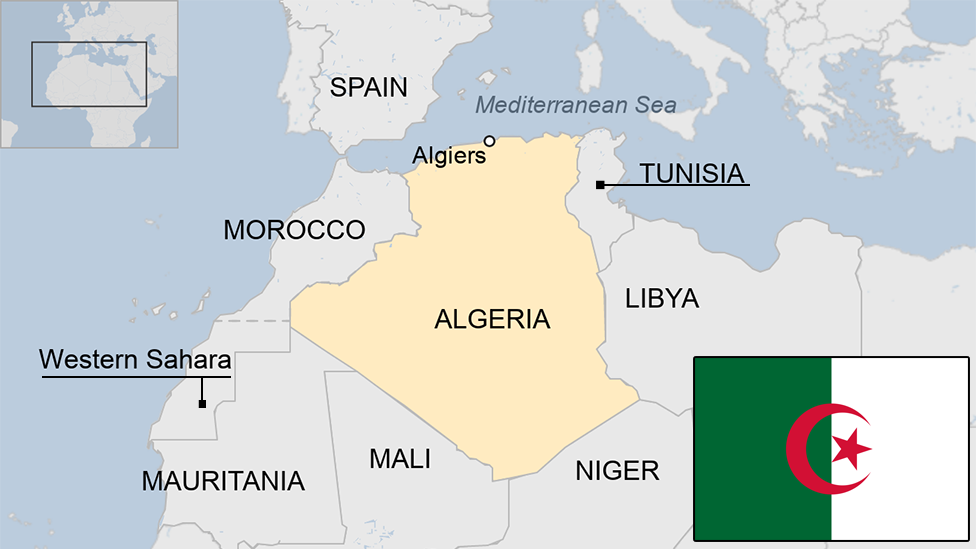Can Algeria's ailing president win a fourth term?
- Published
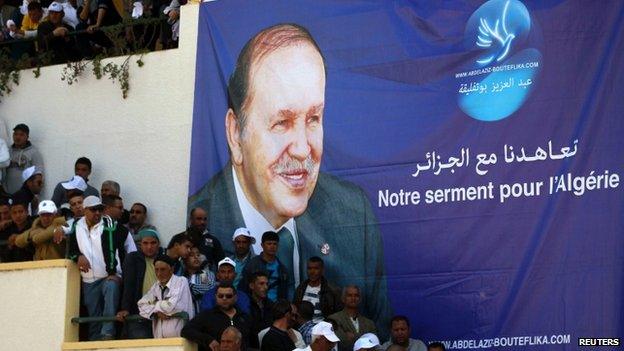
President Bouteflika spent nearly three months in a Paris hospital in 2013
Algerian President Abdelaziz Bouteflika, who has hardly been seen in public since being treated for a stroke a year ago, is seeking a fourth term in this week's elections.
In power since 1999, he faces five other hopefuls. Several opposition groups have called for a boycott, and there have been protests by those who say Mr Bouteflika is unfit to rule because of ill health.
What are Mr Bouteflika's chances?
Mr Bouteflika is the favourite. He comfortably won the past three presidential elections, and has at some point beaten all of the candidates in this race, apart from first-time challenger Abdelaziz Belaid.
The other candidates and some observers allege that state resources are being used in a way that gives him an unfair advantage.
Despite his rare appearances, supporters say Mr Bouteflika remains popular with many Algerians, particularly for helping to end the devastating 1990s civil war.
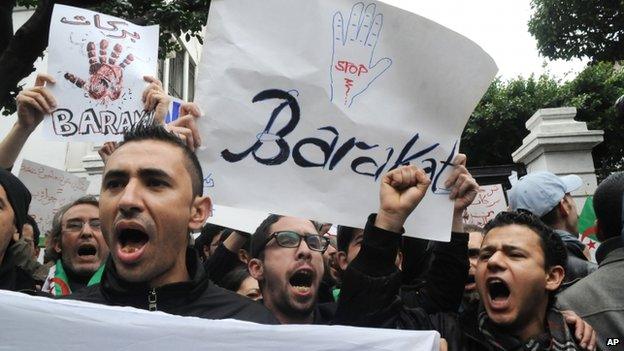
Demonstrators from the Barakat (Enough) group at a rally against President Bouteflika
Why the protests?
The announcement last month that Mr Bouteflika would be standing for re-election spawned a protest movement - called Barakat, or "Enough". Several anti-Bouteflika demonstrations have been held around the country.
Some of his opponents say he is unfit to govern because of ill health. Others had been hoping he would hand over to a new generation of leaders.
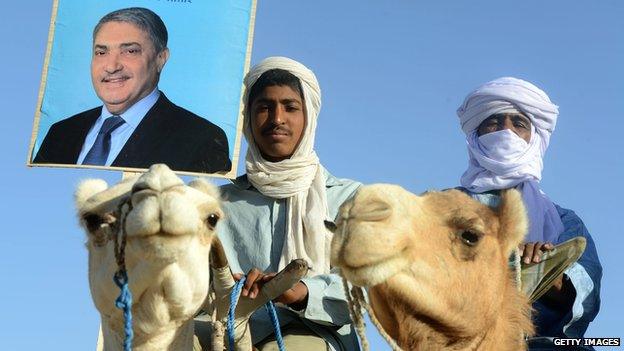
Supporters of former Prime Minister Ali Benflis have been campaigning in the Sahara desert
What is his state of health?
Mr Bouteflika spent nearly three months in a Paris hospital in 2013 following a stroke and since then he has only rarely spoken in public. Other figures have campaigned on his behalf.
One of his main campaigners, former Prime Minister Abdelmalek Sellal, said the president was not ill, but recovering, and only needed "some more days before he can walk well again".
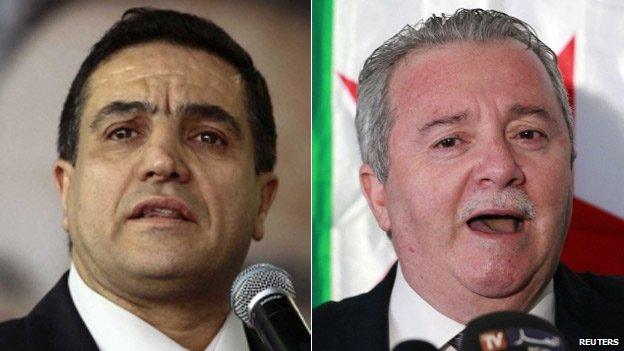
El-Moustakbel Front leader Abdelaziz Belaid (L) and the Ahd 54 party's Ali Fawzi Rebaine
Why the opposition boycott?
Some opposition parties have called on voters to boycott the election because they believe its outcome has already been determined.
Three candidates - former Prime Minister Ahmed Benbitour, Jil Djadid party leader Sofiane Djilali and retired army general Mohand Tahar Yala - pulled out of the race soon after Mr Bouteflika's candidacy was announced, saying the result was now a foregone conclusion.
Why is Mr Bouteflika standing again?
His promoters say he is the right man for the job. In the words of campaign spokesman Amara Benyounes: ''President Bouteflika is best equipped to lead the country in this period of uncertainty and turbulence in the region.''
Some opponents, however, believe their country is run by informal networks of influential and unaccountable men who are keen to retain Mr Bouteflika as front man.
Col Ahmed Bencherif, a former police commander and agriculture minister, told a campaign rally that a political and financial "mafia" led by Said Bouteflika, the president's brother, had usurped power when Mr Bouteflika fell ill.
Another candidate, Ali Benflis, has likened the Algerian state to "a small cluster of villages ruled openly by one family''.
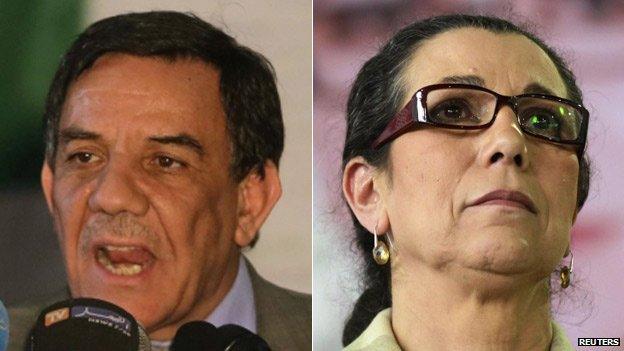
Leader of the Algerian National Front Moussa Touati (L) and Workers Party head Louisa Hanoune
Who are Mr Bouteflika's rivals?
Former Prime Minister Ali Benflis, 69, is considered Mr Bouteflika's key challenger. He ran the president's campaign in 1999, but stood against him in 2004.
Louisa Hanoune, 59, is the only woman in the race. She is a member of parliament and a prominent left-wing politician. She heads the Workers' Party.
Moussa Touati, 60, is leader of the Algerian National Front, which he set up in 1999.
Ali Fawzi Rebaine, 59, is leader of the Ahd 54 party. He co-founded Algeria's first human rights group in 1985 and later helped set up a national anti-torture panel. In 1985, he was jailed on charges of undermining state security.
Abdelaziz Belaid, 50, is a first-time challenger for the presidency. He has headed the opposition El-Moustakbel Front since 2012, after quitting the governing NFL (National Liberation Front).
BBC Monitoring, external reports and analyses news from TV, radio, web and print media around the world. For more reports from BBC Monitoring, click here. You can follow BBC Monitoring on Twitter, external and Facebook, external.
- Published25 March 2014
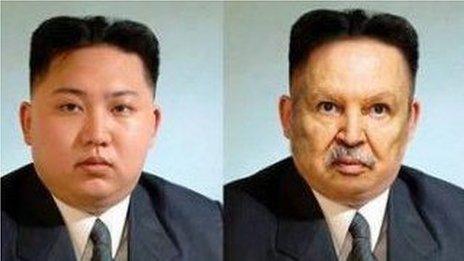
- Published22 March 2014
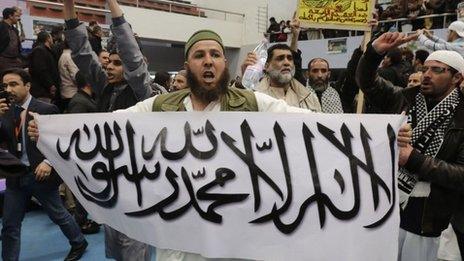
- Published9 September 2024
